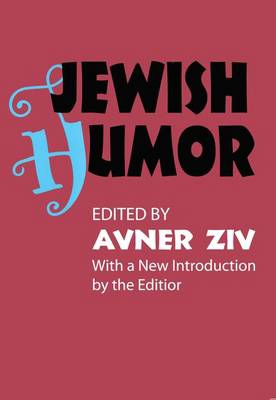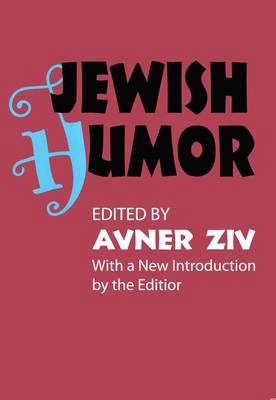
En raison d'une grêve chez bpost, votre commande pourrait être retardée. Vous avez besoin d’un livre rapidement ? Nos magasins vous accueillent à bras ouverts !
- Retrait gratuit dans votre magasin Club
- 7.000.000 titres dans notre catalogue
- Payer en toute sécurité
- Toujours un magasin près de chez vous
En raison de la grêve chez bpost, votre commande pourrait être retardée. Vous avez besoin d’un livre rapidement ? Nos magasins vous accueillent à bras ouverts !
- Retrait gratuit dans votre magasin Club
- 7.000.0000 titres dans notre catalogue
- Payer en toute sécurité
- Toujours un magasin près de chez vous
Description
The thirteen chapters in this book are derived from the First International Conference on Jewish Humor held at Tel-Aviv University. The authors are scientists from the areas of literature, linguistics, sociology, psychology, history, communications, the theater, and Jewish studies. They all try to understand different aspects of Jewish humor, and they evoke associations, of a local-logical nature, with Jewish tradition. This compilation reflects the first interdisciplinary approach to Jewish humor. The chapters are arranged in four parts. The first section relates to humor as a way of coping with Jewish identity. Joseph Dorinson's chapter underscores the dilemma facing Jewish comedians in the United States. These comics try to assimilate into American culture, but without giving up their Jewish identity. The second section of the book deals with a central function of humor--aggression. Christie Davies makes a clear distinction between jokes that present the Jew as a victim of anti-Semitic attacks and those in which the approach is not aggressive. The third part focuses on humor in the Jewish tradition. Lawrence E. Mintz writes about jokes involving Jewish and Christian clergymen. The last part of the book deals with humor in Israel. David Alexander talks about the development of satire in Israel. Other chapters and contributors include: "Psycho-Social Aspects of Jewish Humor in Israel and in the Diaspora" by Avner Ziv; "Humor and Sexism: The Case of the Jewish Joke" by Esther Fuchs; "Halachic Issues as Satirical Elements in Nineteenth Century Hebrew Literature" by Yehuda Friedlander; "Do Jews in Israel still laugh at themselves?" by O. Nevo; and "Political Caricature as a Reflection of Israel's Development" by Kariel Gardosh. Each chapter in this volume paves the way for understanding the many facets of Jewish humor. This book will be immensely enjoyable and informative for sociologists, psychologists, and scholars of Judaic studies.
Spécifications
Parties prenantes
- Auteur(s) :
- Editeur:
Contenu
- Nombre de pages :
- 226
- Langue:
- Anglais
- Collection :
Caractéristiques
- EAN:
- 9781560009917
- Date de parution :
- 30-01-97
- Format:
- Livre broché
- Format numérique:
- Trade paperback (VS)
- Dimensions :
- 154 mm x 230 mm
- Poids :
- 394 g

Les avis
Nous publions uniquement les avis qui respectent les conditions requises. Consultez nos conditions pour les avis.






